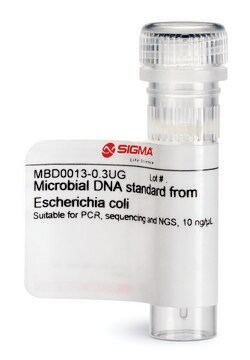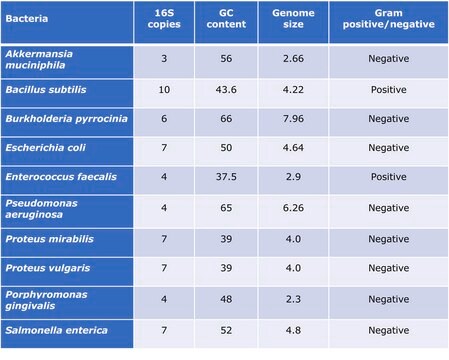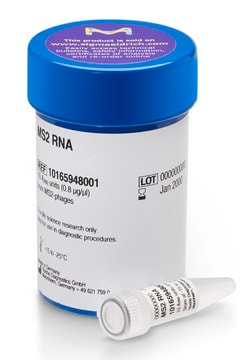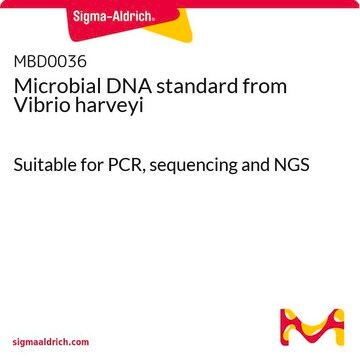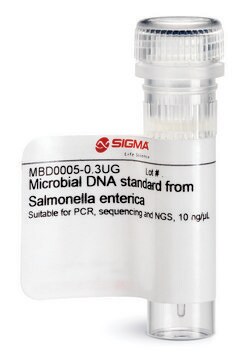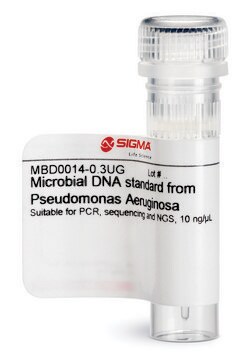MBD0038
Fungal DNA standard from Aspergillus fumigatus
Suitable for PCR, sequencing and NGS
Se connecterpour consulter vos tarifs contractuels et ceux de votre entreprise/organisme
About This Item
Code UNSPSC :
41105500
Nomenclature NACRES :
NA.24
Produits recommandés
Niveau de qualité
Forme
liquid
Concentration
10 ng/μL
Technique(s)
FISH: suitable
Conditions d'expédition
ambient
Température de stockage
−20°C
Description générale
Standardization of sample analysis is essential in microbiome genomics research workflow. Lack of standardization can lead to biases and errors in common processes during sample preparation and analysis such as sample amplification, sequencing, and bioinformatics analyses.1 The human microbiome includes not only bacteria, but also viruses and fungi. While the “bacteriome” field has been researched extensively in the past years, fungi, comprising the “mycobiome”, remain relatively neglected. Fungi and yeasts have been shown to be involved in illness conditions such as cancer and gastrointestinal disease. The human gut is populated by three fungal phyla, Ascomycota, Basidiomycota, and Zygomycota.
The fungal microbial genomic DNA standard from Aspergillus fumigatus can serve as standard for benchmarking the performance along the workflow of microbiome research and metagenomic analyses, as well as a tool to increase reproducibility and allow comparison of results obtained by different labs.
Aspergillus fumigatus is an ubiquitous saprotroph fungus belonging to Ascomycota. Aspergillus fumigatus spores can induce allergic airways response after antibiotic treatment2. With increases in the number of immunosuppressed patients, there has been a dramatic increase in severe and usually fatal invasive aspergillosis, caused by the conidia of Aspergillus species. Aspergillosis is now the most common mold infection worldwide.3
The genomic DNA is provided at ≥10 ng/μL concentration in TE buffer pH 8.0. It is recommended to avoid freeze thaw cycles with this product.
Read here how to use our standards to ensure data integrity for your microbiome research.
The fungal microbial genomic DNA standard from Aspergillus fumigatus can serve as standard for benchmarking the performance along the workflow of microbiome research and metagenomic analyses, as well as a tool to increase reproducibility and allow comparison of results obtained by different labs.
Aspergillus fumigatus is an ubiquitous saprotroph fungus belonging to Ascomycota. Aspergillus fumigatus spores can induce allergic airways response after antibiotic treatment2. With increases in the number of immunosuppressed patients, there has been a dramatic increase in severe and usually fatal invasive aspergillosis, caused by the conidia of Aspergillus species. Aspergillosis is now the most common mold infection worldwide.3
The genomic DNA is provided at ≥10 ng/μL concentration in TE buffer pH 8.0. It is recommended to avoid freeze thaw cycles with this product.
Read here how to use our standards to ensure data integrity for your microbiome research.
Application
Suitable as a standard for PCR, Sanger and next generation sequencing (NGS).
Caractéristiques et avantages
- Individual microbial standard for microbiomics and meta-genomics workflow
- Suitable standard for PCR, Sanger sequencing and 18S NGS
- Improves bioinformatics analyses
- Increases reproducibility and repeatability
- Identity and purity of the genomic Aspergillus fumigatus DNA has been confirmed by 18S NGS and gel electrophoresis
Forme physique
Liquid -The genomic DNA is provided at ≥10 ng/μl concentration in TE buffer pH 8.0
Code de la classe de stockage
12 - Non Combustible Liquids
Classe de danger pour l'eau (WGK)
WGK 1
Certificats d'analyse (COA)
Recherchez un Certificats d'analyse (COA) en saisissant le numéro de lot du produit. Les numéros de lot figurent sur l'étiquette du produit après les mots "Lot" ou "Batch".
Déjà en possession de ce produit ?
Retrouvez la documentation relative aux produits que vous avez récemment achetés dans la Bibliothèque de documents.
Notre équipe de scientifiques dispose d'une expérience dans tous les secteurs de la recherche, notamment en sciences de la vie, science des matériaux, synthèse chimique, chromatographie, analyse et dans de nombreux autres domaines..
Contacter notre Service technique